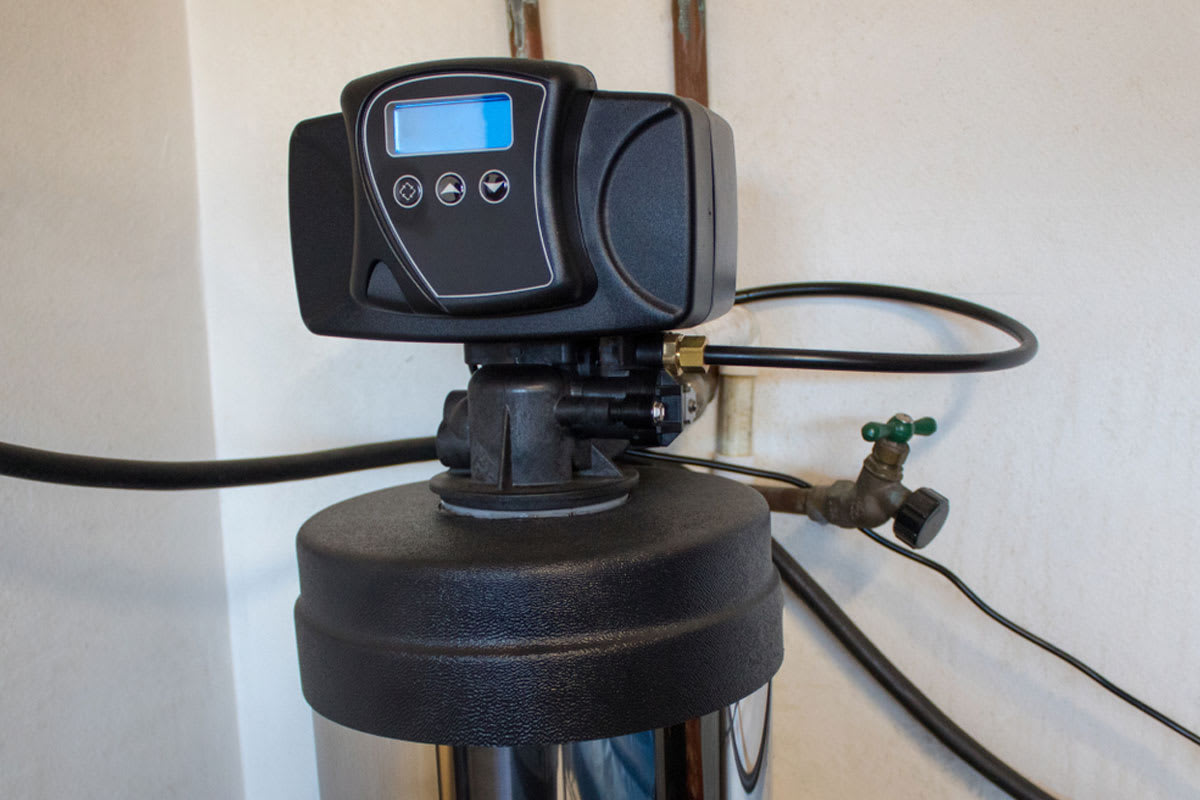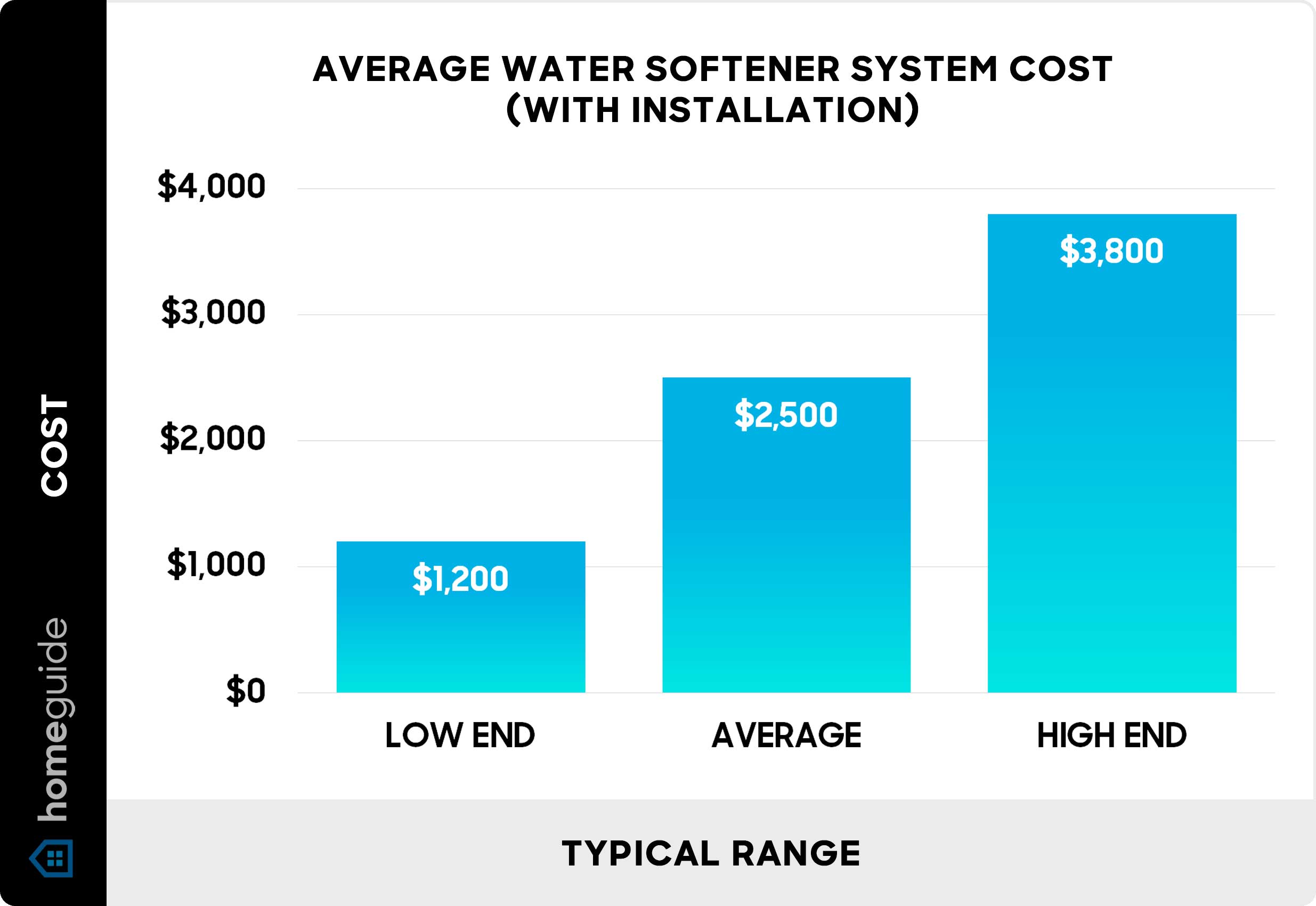
How much does a water softener cost?
How much does a water softener cost?
$1,200 – $3,800 average cost (softener + installation labor)
Average water softener system cost
A water softener system costs $1,200 to $3,800 with installation, depending on the system capacity, water hardness level, and local labor rates. Salt-based water softeners, also called ion exchange softeners, are the most popular type for homes. Salt-free systems cost more at $1,500 to $4,500 and are not as effective for homes with extremely hard water.

| National Average Cost | $2,500 |
| Minimum Cost | $800 |
| Maximum Cost | $8,000 |
| Average Range | $1,200 to $3,800 |
Water softener cost by type
There are several different types of water softening systems. Each type uses different technology and comes with its own advantages, disadvantages, and price point. The table below shows the average cost for the most popular types of systems for residential use.
| Water softener type | Average cost installed |
|---|---|
| Salt-based / ion exchange | $1,200 – $3,800 |
| Dual-tank ion exchange | $1,700 – $5,000 |
| Salt-free | $1,500 – $4,500 |
| Magnetic | $2,000 – $6,000 |
| Reverse osmosis | $4,800 – $10,000 |
Salt-based water softener
A salt-based water softener system costs $1,200 to $3,800 with installation. Salt-based water softeners, also called ion exchange softeners, are the most popular type for residential use. These systems work by replacing calcium and magnesium ions in hard water with sodium ions, effectively removing the minerals that cause hardness.
Ion exchange systems require regular salt additions and periodic maintenance, but they provide the most effective hard water treatment available.
Dual-tank water softener
A dual-tank water softener costs $1,700 to $5,000 with installation. Dual-tank systems use the same process as salt-based softeners but feature two resin tanks that alternate operation, ensuring a continuous soft water supply even during regeneration cycles.
These systems are perfect for large households or homes with high water usage because they never interrupt the soft water supply.
Salt-free water softener
A salt-free water softener costs $1,500 to $4,500 with installation. These systems use template-assisted crystallization (TAC) technology to change the structure of hard water minerals without removing them. While salt-free systems don't technically soften water, they prevent scale formation and require minimal maintenance.
Salt-free systems are best suited for homeowners who want to avoid adding sodium to their water supply or prefer a low-maintenance solution. These systems work well for moderate hardness levels and provide environmental benefits by eliminating salt discharge, but they're not as effective as salt-based systems at reducing water hardness.
Magnetic water softener
A whole-house magnetic water distiller costs $2,000 to $6,000 with installation. These systems use magnetic fields to alter the molecular structure of hard water minerals, though they're technically water distillers rather than traditional softeners.
Magnetic systems require no salt, chemicals, or electricity, making them environmentally friendly and maintenance-free. However, their effectiveness varies depending on the water chemistry and flow rates. They work best as a supplementary treatment rather than a primary softening solution.
Reverse osmosis system
A whole-house reverse osmosis system costs $4,800 to $10,000 on average, including installation. This type of water filtration device uses a semi-permeable membrane to separate and remove contaminants.
Reverse osmosis systems provide the most comprehensive water treatment available, removing not only hardness minerals but also contaminants like chlorine, bacteria, and heavy metals. However, they require significant water pressure and produce wastewater during operation.
Reverse osmosis systems use filters that cost $30 to $150 and require replacement every 6 to 12 months. The membrane costs $40 to $250 and should be replaced every 2 to 3 years.
Water softener installation cost factors
In addition to the type of water softener system, several other factors influence the total project cost:
Home size & softener capacity
Your household size directly affects water usage and determines the softener capacity needed. Larger homes require systems with greater capacity to handle higher water demand effectively. Higher capacity systems cost more up front but provide better long-term value for larger households. Undersized systems regenerate more frequently, increasing salt usage and reducing the system's lifespan.
Water hardness level
Water hardness levels vary significantly by location and directly affect the capacity and type of water softener needed. Areas with extremely hard water require more robust systems with higher capacity ratings.
| Hardness level | Grains per gallon | Softening needed |
|---|---|---|
| Soft | 0 – 3.5 | No treatment needed |
| Moderately hard | 3.5 – 7 | May benefit from softening |
| Hard | 7 – 10 | Softening recommended |
| Very hard | 10 – 20 | Softening essential |
Homes in areas with extremely hard water may require larger capacity systems or more frequent regeneration cycles, increasing both equipment and operating costs.
Labor cost
Labor costs for professional installation depend on local labor rates, the job complexity, and the extent of plumbing modifications needed. Several factors influence labor expenses:
Existing plumbing configuration: Homes with existing soft water loops require less modification. Drain line installation or water line rerouting adds to the cost. Complex installations requiring significant plumbing modifications cost more than straightforward replacements.
Accessibility: Easy access to the installation area and main water lines reduces the installation time and labor needed.
Electrical requirements: Some systems need a dedicated electrical circuit, increasing the total project cost. The average cost to install a dedicated electrical circuit is $250 to $900 for labor and materials.
Permit requirements: Local codes may require permits and inspections.
Ongoing costs
Water softener ownership involves ongoing expenses beyond the initial installation cost. Remember to factor these recurring costs into your budget:
Water softener salt or potassium costs $50 to $150 per year, depending on the system efficiency and water hardness levels. High-efficiency systems use less salt per regeneration cycle, reducing operating expenses over time.
Water filters cost $30 to $100+ each. Salt-based water softener systems don't require filters, but other types of systems do.
Maintenance costs range from $100 to $300+ per year, depending on the system type, size, and complexity.
What size water softener do I need?
The ideal water softener size depends on your household's daily water usage and the water hardness level. Calculate your needs using this formula:
Daily water usage × Water hardness level = Daily grain removal needed
For example, for a family using 400 gallons daily with 20 grains per gallon hardness:
400 gallons × 20 grains = 8,000 daily grain removal needed
Then, multiply the daily grain removal needed by 3 to 7, depending on how many days you want the softener to operate before it regenerates. For example, if you'd like the softener to regenerate every 4 days:
8,000 daily grain removal needed x 4 = 32,000 water softener capacity
Water softener FAQs
How does a water softener work?
Water softeners use ion exchange technology to remove calcium and magnesium ions from hard water. The system contains resin beads charged with sodium ions. As hard water passes through the resin tank, calcium and magnesium ions attach to the beads while sodium ions release into the water supply.
When the resin becomes saturated with hardness minerals, the system regenerates by flushing the tank with salt water. This process removes the accumulated minerals and recharges the resin beads with fresh sodium ions.
Do I need a water softener?
Getting your water professionally tested to check the hardness level is the best way to determine whether your home needs a water softener or not. Signs that indicate you might benefit from water softening include:
White scale buildup on faucets and fixtures
Soap scum in showers and bathtubs
Dry, itchy skin after bathing
Dingy or stiff laundry
Reduced water flow in pipes
Frequent repairs needed for water-using appliances
Hard water testing costs $130 to $200 for a basic test that indicates the presence of various metals and minerals. Professional testing provides accurate hardness measurements and identifies other water quality issues.
How long do water softeners last?
Quality water softeners last 15 to 20 years with proper maintenance. The lifespan depends on the water quality and hardness, water usage, the system quality, and the maintenance frequency. Regular maintenance, including cleaning the brine tank and checking salt levels, will maximize the system's longevity and performance.
Are water softeners worth it?
Water softeners provide significant long-term benefits that can justify the investment cost:
Financial benefits:
Extended appliance lifespan (water heaters, dishwashers, washing machines)
Reduced plumbing repairs and replacement costs
Lower soap and detergent usage
Improved energy efficiency of water-using appliances
Quality of life improvements:
Softer skin and hair
Brighter, softer laundry
Easier cleaning with less soap scum
Better tasting water (varies by system type)
However, water softeners also come with some disadvantages, including extra water waste, potential health effects from increased sodium consumption, negative impacts to the environment due to salt use, and the potential for corroded pipes.
Can you drink water from a water softener?
Softened water is safe to drink for most people. The ion exchange process adds small amounts of sodium to replace calcium and magnesium ions. However, the sodium content remains relatively low compared to dietary sodium intake.
People on sodium-restricted diets should consult their healthcare provider before drinking softened water. Alternative options include:
Installing a bypass for drinking water taps
Using an under-sink reverse osmosis system for drinking water
Choosing potassium chloride instead of sodium chloride for regeneration

Getting estimates from water softener installers
Follow these tips to ensure you choose an experienced, reputable water softener installer near you:
Get quotes from at least three installers to compare prices, equipment, and warranties.
Read reviews of water softener companies on HomeGuide and Google.
Select companies that are licensed, insured, and have been in business for 5+ years.
Ask for a detailed written estimate and contract before work begins.
Avoid selecting the lowest quote, as it may indicate lower-quality equipment or workmanship.
Questions to ask water softener companies
When evaluating water softener installers, ask these questions:
How much experience do you have installing water softeners?
Are you licensed and insured for plumbing work?
What water softener brands do you install, and why do you recommend them?
Can you provide references from recent installations?
How do you determine the right system size for my home?
Will the job require a permit? If yes, will you obtain it?
How long will the installation take?
What happens if problems arise after installation?
What warranties do you offer on the equipment and installation?
What ongoing maintenance will the system require?
Do you offer service contracts or maintenance plans?